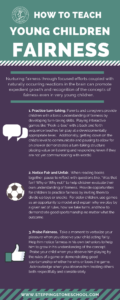How to Teach Young Children Fairness
Have you ever wondered why we enjoy sporting events where the “underdog” wins the day or hearing “rags to riches” human interest stories?
Using functional MRIs, a team of researchers at Rutgers University discovered how the brain reacts to perceived fair and unfair treatment of others. Their findings demonstrate higher levels of brain activity when one perceives fair treatment of another. Additionally, they observed decreased activity when one perceives incidences of unfairness or inequity. These findings suggest that our sense of fairness is not entirely based on a set of learned social rules, but suggest “nature and nurture” working together. (Tricomi, Rangel, Camerer, O’Doherty, 2010)
This month at Stepping Stone School, we will focus our attention on the character goal of fairness. Younger children will learn foundational practices of fairness like sharing, caring for others, and following guidelines for safe play. Older children will extend their learning by observing fairness in children’s literature and acting out what fair and unfair may look like in a classroom situation.
In addition, here are some other ideas for teaching fairness to young children:
- Practice turn-taking. Parents and caregivers provide children with a basic understanding of fairness by developing turn-taking skills. Playing interactive games like “Peek-a-boo” with a back and forth sequence teaches fair play at a developmentally appropriate level. Additionally, getting down on the child’s level to communicate and pausing to allow for an answer demonstrates a turn-taking structure placing value on listening and responding (even if they are not yet communicating with words).
- Notice Fair and Unfair. When reading books together, pause to reflect with questions like, “Was that fair? Why or Why not?” to help children evaluate their own understanding of fairness. Provide opportunities for children to practice fairness by inviting them to divide up toys or snacks. For older children, use games as an opportunity to model and explain why we play by a given set of rules, how we take turns, and how to demonstrate good sportsmanship no matter what the outcome.
- Praise Fairness. Take a moment to verbalize your pleasure when you observe your child acting fairly. Help him notice fairness in his own behaviors to help him to grow in his understanding of the concept. Praise your child when you observe him playing by the rules of a game or demonstrating good sportsmanship whether he wins or loses the game. Acknowledge when you observe him treating others both respectfully and considerately.Nurturing fairness through focused efforts coupled with naturally occurring reactions in the brain can promote expedient growth and recognition of the concepts of fairness even in very young children.

Nurturing fairness through focused efforts coupled with naturally occurring reactions in the brain can promote expedient growth and recognition of the concepts of fairness even in very young children.
References:
Innis, G. (2012, May 16).“Teaching “Fairness” To Preschoolers Is One More Way To Build Character.” Michigan State University Extension. Retrieved on July 15, 2015, from http://msue.anr.msu.edu/news/teaching_fairness_to_preschoolers_is_one_more_way_to_build_character
Kuchinskas, S. (2011). “Teaching Children to Be Fair.” Retrieved on July 6, 2016, from http://www.webmd.com/parenting/features/teaching-children-to-be-fair
Philpott, S. (n.d). Games for Taking Turns for Toddlers. Retrieved from http://mom.me/toddler/6283-games-taking-turns-toddlers/
Tricomi, E., Rangel, A., Camerer, C.F., O’Doherty, J.P. (2010, Feb. 25). Neural Evidence for Inequality-Averse Social Preferences. Nature: International Journal of Science, 463, 1089-1091. Retrieved from https://www.nature.com/articles/nature08785